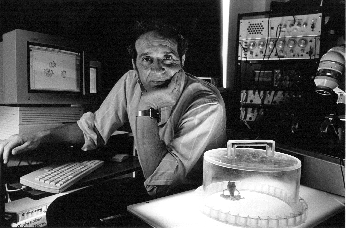|
ACADEMIC CAREER
B.A, Harvard University, 1969
M.A., Ph.D., Stanford University, 1970, 1973
Postdoctoral Fellowships at Johns Hopkins University, Stanford University
Assistant and Associate Professor, University of Chicago, 1974-1985
Professor of Biology, Bryn Mawr College, 1986-present
1986-1993, Chair of Department
1988-present, Eleanor A. Bliss Professorship
2000-present, Director, Center for Science in Society
Grant Involvements (partial list)
Research grants from NSF, NIH, Whitehall Foundation
Neural and Behavior Systems Group, A TIDE-POOL project (private donor)
Howard Hughes Medical Institute Undergraduate Science Education grant to Bryn Mawr College (PI)
Selected Publications
Blank, D., Cassidy, K., Dalke, A., and Grobstein, P. (2004) Emergent Pedagogy: Learning to Enjoy the Uncontrollable and Make it Productive, submitted
Grobstein, P. (2004) Making the Unconscious Conscious, and Vice Versa: A Bi-directional Bridge Between Neuroscience/Cognitive Science and Psychotherapy?, submitted
Grobstein, P. (2003) Getting
it less wrong, the brain's way: science, pragmatism, and multiplism,
IN Interpretation and Its Objects: Studies in the Philosophy of Michael
Krausz (A. Ritvoi, ed.), Rodopi, pp 153-166
Dalke A., McCormack, E, and Grobstein, P. (2003) Theorizing
Interdisciplinarity: The Evolution of New Academic and Intellectual Communities,
submitted
Dalke A. and Grobstein, P. (2003) Story-Telling
in (At Least) Three Dimensions: An Exploration of Teaching Reading, Writing,
and Beyond, submitted
Grobstein, P. (2002) Who's afraid
of Emily Dickinson, or how I learned to stop worrying and love the brain,
Newsletter of the Psychoanalytic Center of Philadelphia
Patton, P. and Grobstein, P (1998) The effects of telencephalic
lesions on visually mediated prey orienting behavior in the frog (Rana
pipiens). I. The effects of complete removal of one telencephalic lobe,
with a comparison to the effects of unilateral tectal lobe lesions. Brain,
Behavior, and Evolution 51: 123-143.
Patton, P. and Grobstein, P (1998) The effects of
telencephalic lesions on visually mediated prey orienting behavior in
the frog (Rana pipiens). II. The effect of limited lesions to the telencephalon.
Brain, Behavior, and Evolution 51: 144-161.
Grobstein, P. et al. (1995-present) Serendip, a WWW resource - http://serendipstudio.org
Includes:
On Beyond Newton: From Simple Rules to Stability, Fluctuation, and Chaos
The Magic Sierpinski Triangle, Order Dependent on Randomness
Simple Networks, Simple Rules: Learning and Creating Categories
Time to Think?
Grobstein, P. (1994)
Variability in behavior and the nervous system. In: Encyclopedia of
Human Behavior, Volume 4 (V.S. Ramachandran, ed.), Academic Press,
447-458.
Grobstein, P. (1992) Directed movement in the frog: motor
choice, spatial representation, free will? In: Neurobiology of Motor
Programme Selection: New Approaches to Mechanisms of Behavioral Choice.
(Kien, J., McCrohan, C., Winlow, B., eds.), Pergamon Press, pp 251-279.
Grobstein, P. (1990) Strategies for analyzing complex
organization in the nervous system. I. Lesion experiments, the old rediscovered.
In: Computational Neuroscience. (Schwartz, E., ed.), MIT Press,
pp 19-37.
Grobstein, P. (1988) From the head to the
heart: some thoughts on similarities between brain function and morphogenesis,
and on their significance for research methodology and biological theory.
Experientia 44: 961-971.
Using Thinking to Try and Make a Difference
(recent essays available on Serendip)
Writing Descartes: I Am, and I Can Think, Therefore ... , June 2004
Science Matters ... How?, November
2003
The Neurobiology of Parenting,
November 2003
Some Thoughts on Academic Structure
(and Socio-Political Structures Generally): A Biological Metaphor as an
Alternative to Both State's Rights and Federalism, November 2003
"I Believe ... ": Its Significance and
Limitations for Individuals, Science, and Politics, July 2003
Language/Science/Politics 101: War Is
A Bad Metaphor, June 2003
ADDITIONAL INFORMATION
Bryn Mawr College courses
Additional teaching activities
Recent web-based talks/presentations
- Science in Society in the 21st Century: Interdisciplinarity and Beyond, August, 2004
- Teaching With/On the Web,
April 2004
- A Biological Perspective on Mental Health, February 2004
- Is
There Life on Mars? A Story About ... A Contemporary Chapter of a Story
in Progress, January 2004
- Emerging
Emergence, A Report on Progress: From the Active Inanimate to Models
to Stories to Agency (and Back Again), January 2004
- Education
as Applied Neurobiology: Students and Teachers as Story Tellers/Listeners/Exchangers,
January 2004
- Quantity, quality,
and value: A View from the Brain, December 2003
- Understanding the Brain: Implications
for Education, and the Bryn Mawr Center for Science in Society: Learning
to Put Theory into Practice, November 2003
- One Man's Story of Learning
Through Diversity, (October, 2003)
- Psychoanalysis and Neuroscience: Enemies,
Acquaintances, Bedfellows?, (October, 2003)
- A
Story of Emergence Emerging (September, 2003)
- Emergence and Contingency/Purpose/Agency:
An Exploration of an Intersection Between History and Biology/Neurobiology,
September, 2003
- College Seminar and the
Public/Private Arenas (August, 2003, with Anne Dalke)
- Mind-Body Connection:
The Brain, 9 April 2003
- A Vision of Science (and Science Education)
in the 21st Century: Everybody "Getting It Less Wrong" Together
(3 April, 2003, Illinois Science and Mathematics Academy, see paper)
- Timing the Conscious and the
Unconscious: Some Implications for Thinking ... and Thinking About Time
(18 March 2003)
- Understanding the Brain: Implications
for Education (19 December 2002, Counseling Association of Greater
Philadelphia)
- Philosophies
of Science: A View From the Brain (11 December 2002)
- From Complex Systems
to Emergence: A General Conceptual and Philosophical Perspective
(November 15, 2002)
- The Brain's Images: Co-Constructing
Reality and Self (11 August 2002, 11th Annual Usability Professional's
Organization Meeting, see Paper)
- Loopiness As a Pedagogical
Methodology (May, 2002, with Anne Dalke)
- Introductory Science: Experiments
in Bridging Cultures (spring, 2002)
- Depression, or (Better?)
Thinking About Mood (spring 2002)
- Brains, Computers, and Education
2000, a five year progress report
New Serendip exhibits
Additional available web materials (partial list)

Bryn Mawr College information
Biology Department information
pgrobste@brynmawr.edu
610 526-5098
Department of Biology, Bryn Mawr College, Bryn Mawr, Pennsylvania 19010
| |




 I'm also a biologist and philosopher, with an array of more general interests in the underpinnings of human behavior, the nature of biological, cultural, and intellectual change, complex systems and general information processing principles, and the character of human understanding and the relationships among its different forms. In recent years, I've been devoting increased time to thinking about the implications of current and anticipated understandings of the brain for a variety of practical and philosophical issues, including mental health, child-rearing, political decision-making, and education Associated with this is a strong commitment to improving the educational environment at all levels and for all people.
I'm also a biologist and philosopher, with an array of more general interests in the underpinnings of human behavior, the nature of biological, cultural, and intellectual change, complex systems and general information processing principles, and the character of human understanding and the relationships among its different forms. In recent years, I've been devoting increased time to thinking about the implications of current and anticipated understandings of the brain for a variety of practical and philosophical issues, including mental health, child-rearing, political decision-making, and education Associated with this is a strong commitment to improving the educational environment at all levels and for all people.